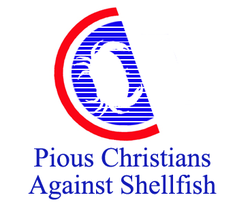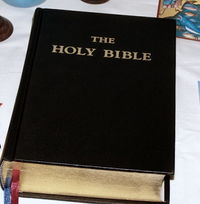Pious Christians Against Shellfish
“Whatever in the water does not have fins or scales; that shall be an abomination to you.”
– Leviticus 11:12
Pious Christians Against Shellfish (often abbreviated PCASF) was a radical American religious group active from 1981 until 2003. The group’s primary cause was—in the words of founder Rev. Michael Fordworth—the “holy crusade against shellfish, people who eat shellfish, and shellfish eaters,” all of whom, according to the group, were “destroying America and eroding family values” by either consuming or pushing for the consumption of shellfish like Lobster, Crab, and Shrimp—something that is expressly forbidden in the Bible.
Background
“We don’t hate people who eat shellfish—God does.”
– Rev. Michael Fordworth, 1984
The aim of Pious Christians Against Shellfish was the protection of “family values” from the perceived evils of shellfish consumption—something that is expressly forbidden in the book of Leviticus. The Bible passages most commonly cited by the group are Leviticus 11:9-12, which read:
| “ | These you may eat of all that are in the water: whatever in the water has fins and scales, whether in the seas or in the rivers; that you may eat. But all in the seas or in the rivers that do not have fins and scales, all that move in the water or any living thing which is in the water, they are an abomination to you. They shall be an abomination to you; you shall not eat their flesh, but you shall regard their carcasses as an abomination. Whatever in the water does not have fins or scales; that shall be an abomination to you. | ” |
As shellfish—or, more precisely, any marine animal without scales—are said to be an abomination and unfit for human consumption, anyone who partakes in shellfish flesh is a sinner, according to the tenets of the group.
Early History
“As a mother, I know that people who eat shellfish are all inherently evil for some reason.”
– Anita Bryant, 1982
Pious Christians Against Shellfish was founded by Rev. Michael Fordworth in 1981. When put into historical context, the organization’s founding can be considered part of the rise of the “New Right” in the early 1980s, although PSASF was certainly among the most radical of the Conservative organizations and think tanks that emerged during that period.
The group’s initial membership was small, and stayed such for the first two-to-three years of its existence. However, in the mid 1980s—around the same time casual dining restaurant chain Red Lobster became popular—the group began to grow rapidly. Pious Christians Against Shellfish had 5000 active members spread throughout the United States by 1985, and twice that number by 1987. Although the group’s numbers peaked in 1988 before steadily declining thereafter throughout the 1990s, it was during the 1990s that the group gained its now-infamous reputation.
The Radical Nineties
“Christianity stands for freedom; we don’t want to impose our religion on everyone else. We just don’t want shellfish or shellfish-eater values to be forced upon us….”
– David Limbaugh, 1994
In the early 1990s—perhaps in response to the Leftist swing America experienced during the 1992 Presidential Election—PCASF turned away from its restrained heritage and became a fringe group, organizing some of the most violent and notorious anti-Shellfish acts in US history.
The 1992 Long John Silver’s Bombings

Although not officially organized by PCASF, the all seven people tried and convicted for the bombings of three Long John Silver’s restaurants in the Louisville, Kentucky area had ties to the organization. To this day, the 1992 Long John Silver’s Bombings remain one of the most tragic events in the history of the Long John Silver’s chain.
In the early morning of August 22, 1992, Louisville police responded to an explosion that destroyed the entire back wall of a neighborhood Long John Silver’s restaurant. Though no one was killed—the establishment had not yet opened—the Louisville police were put on alert.
Three days later, another bomb went off on the evening of August 25—the target being another Long John Silver’s. The blast claimed two lives; both dead were fortunately only Long John Silver’s employees. The Louisville police once again investigated, and were able to obtain outdoor surveillance tapes from a Planned Parenthood across the street. The Planned Parenthood’s surveillance cameras caught both the group of bombers and their mode of transportation—a large, nondescript white van—information that would eventually lead to the capture of the “Battered-Fish Bombers,” as they would come to be known, though not before the tragic events of August 27, 1992.
August 27, 1992 would see yet another attack on the Long John Silver’s chain. This bombing, however, took place in the midst of the restaurant’s early-afternoon lunch rush; 14 people—six employees, seven customers, and one person who came in simply to use the restroom—died.
The Long John Silver’s Bombings permanently turned public opinion against the PCASF, and would continue to haunt the organization for the remainder of its existence.
Boycotts and Demonstrations
PCASF was also involved in the organization of several mass anti-shellfish demonstrations and boycotts. Of note are the 1996 Red Lobster Boycott, in which the group both protested and boycotted the restaurant chain (though to little avail), and the 1998 nation-wide anti-seafood demonstration—held in April of that year—in which the group found an unlikely ally in PETA. Current PETA spokesperson Pamela Anderson, retrospectively, said this about the short-lived alliance between the two groups:
| “ | At first things went well enough, but in the end the partnership couldn’t last. We [PETA] were concerned about the well being of animals like otters, dolphins, and seals—you know, all the cute animals. All PCASF cared about were things like crabs and stuff—ewww! It’s lucky we [PETA] disassociated ourselves from those wackos when we did. | ” |
Support of Anti-Shellfish Legislation
Pious Christians Against Shellfish was also fairly influential in the lobbying committee, and wielded perhaps a disproportionate amount of clout when compared to the group’s waning membership. In 1994, PCASF managed to get a bill banning the sale and consumption of shellfish introduced in the United States House of Representatives, though it was defeated quickly. Democrats roundly called the bill “absurd,” while Republicans took the stance that “consuming shellfish should be a matter of States’ Rights.”
Undeterred, the organization continued pressing its agenda. In 1998, the group managed to get the question of shellfish consumption put on the ballot in California. Shellfish’ rights groups were livid over the move, and outspent PCASF forty to one in pro-shellfish ads that aired throughout the state. On Election Day, PCASF won a surprising (and controversial) victory that sparked outrage across that nation. A spokesperson for the Shellfish Eaters’ Defense League had this to say:
| “ | This is a major setback for the shellfish eaters’ community. Needless to say, loosing on the ballot like this in the most liberal state in the Union after spending millions of dollars on advertising is, if anything, a humiliation. It just goes to show that many people, even if they’re reluctant to admit it, just don’t like shellfish. It’s not a question of religion, it’s not because they’re uneducated—they’re just uncomfortable with the idea of a man eating an entire bucket of crab legs. | ” |
The 2000s
“It’s about time we faced up to the truth. If we accept the radical notion that shellfish can be consumed—be it in the kitchen or in a restaurant or in anywhere else—we are utterly destroying the concept of family.”
– Alan Keyes, 2002
Despite their victory in California and the election of a Republican President in 2000, membership in Pious Christians Against Shellfish declined even more in the early 21st century. Many were drawn away from the group by the emergence of other issues during the period, like the Terry Schiavo case and the question of gay marriage. Others, on the other hand, grew disillusioned with the group’s increasingly radical stances. In late 2002, the Michael Fordworth controversy would prove to be the nail in the coffin for the group.
The Michael Fordworth Controversy
On October 16th, 2002, Michael Fordworth was found dining with a gay prostitute in a Red Lobster in Seattle, Washington. The organization’s waning membership was outraged; Rev. Fordworth’s assurances that the entire event was a fabrication of the liberal media did little to halt the exodus. By the middle of 2003, PCASF was all but defunct. Rev. Fordworth would retire from the anti-shellfish circuit, and eventually retired from public life altogether. He died in 2006.
See Also
- God hates people who throw shrimp on the barbie
- Red Lobster
- Lobster
- Crab
- Christians
- Seventh Day Adventist Church
- The Bible



